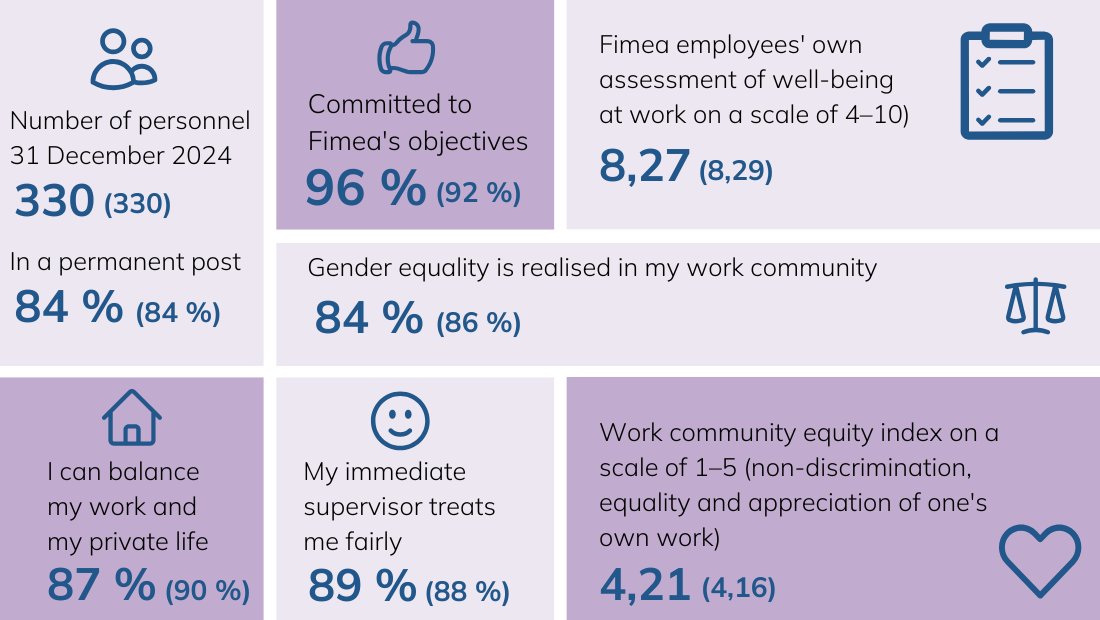Percentage of employees who left to work for another employer during the year as a percentage of the personnel at the end of the previous year.
Fimea’s footprint – social, cultural, ecological and economic responsibility

In responsibility work, footprint refers to the direct impact that an organisation’s existence and actions have on the environment, people and society. Fimea aims to eliminate or reduce the negative social, ecological and economic impacts caused by its operations. Reporting focuses on areas that the agency can directly influence. In central government, some of the footprint of the activities has been centralised to group operators; the operators report on the services they produce.
Social responsibility
Shared expertise and development of supervisory work
In 2024, Fimea finalised a training package on the preparatory approach to expert work, aimed at development towards service expertise and sharing information. During the year, Fimea introduced policies on so-called intelligence augmentation, and personnel were offered a wide range of IT training related to AI. Fimea produced shared materials that were published in eOppiva, namely administration school 1 (Publicity and data requests) and administration school 2 (Making a decision and correcting an error).
Professional leadership was developed in supervisor forums, which included peer mentoring that has helped supervisors get support for specific topics, such as supervisors’ personal resources. The supervisors’ mentoring pilot ended in spring 2024. The pilot lasted six months and had six mentor-mentee pairs.
Fimea is committed to promoting personnel well-being and professional development
To support the well-being of personnel, Fimea conducts workplace surveys and workplace-specific health examinations that allow targeting health examinations to those who need them most. Workplace surveys also help find measures to improve well-being that are specific to each work community. To support well-being at work, Fimea also offers a low-threshold well-being service produced by Auntie for all personnel. In addition to joint webinars, the service includes five conversations with a psychologist on the various challenges of life.
| Year Sort the table ascending by the column | 2020 Sort the table ascending by the column | 2021 Sort the table ascending by the column | 2022 Sort the table ascending by the column | 2023 Sort the table ascending by the column | 2024 Sort the table ascending by the column |
|---|---|---|---|---|---|
| Job satisfaction | 3,71 | 3,75 | 3,76 | 3,79 | 3,82 |

Fimea is committed to supporting the professional development of its personnel and to offering new development opportunities within the agency. In 2024, 16 people switched to new positions internally. The exit turnover of employees is also low compared to other central government agencies, which means that Fimea is able to hold on to its skilled personnel.
In 2024, the number of trainees working at Fimea increased again. This reinforces Fimea’s position as an interesting employer that offers opportunities for professional growth and development.
| Exit turnover Sort the table ascending by the column | 2020 Sort the table ascending by the column | 2021 Sort the table ascending by the column | 2022 Sort the table ascending by the column | 2023 Sort the table ascending by the column | 2024 Sort the table ascending by the column |
|---|---|---|---|---|---|
| Fimea | 3,2 | 3,5 | 3,2 | 7,5 | 4,3 |
| Central government | 5,1 | 7,9 | 6,4 | 7,8 | 15,1 |
| Year Sort the table ascending by the column | 2020 Sort the table ascending by the column | 2021 Sort the table ascending by the column | 2022 Sort the table ascending by the column | 2023 Sort the table ascending by the column | 2024 Sort the table ascending by the column |
|---|---|---|---|---|---|
| Traineeships | 7 | 14 | 11 | 16 | 19 |
Equality was promoted with document accessibility and anonymous recruitment
As an official authority, Fimea’s documents comply with a document standard (SFS 2487). The document standard was updated in June 2024, which is why Fimea’s document templates were also updated. The purpose of the standard is to maintain common practices that facilitate and speed up the preparation, reading and processing of documents. Standard-compliant documents facilitate document automation and data management. Nowadays, documents are almost always digital, they are used on a wide range of terminal devices, and they are processed in various digital document management systems. The new standard ensures that documents can be used on any device. In addition, the standard takes accessibility into account already when drawing up the document, making sure that the information in the document is more likely accessible for everyone.
In 2024, Fimea carried out its first anonymous recruitments. Anonymous recruitments aim at a more uniform and equal application process. Interviewed applicants are selected without knowing their name, age, gender, municipality, native language, nationality or appearance. Experiences of this process were positive, and anonymous recruitments will be prioritised in the future as well.
Communication channels were updated to support a sense of community among personnel
Fimea updated its work community communication channels by introducing a new intranet and a social media channel intended for organisational use. The new SharePoint intranet is a user-friendly and modern platform that meets accessibility requirements. Social media channel Viva Engage enables virtual encounters that increase and maintain social cohesion. The aim of the update was to support a sense of community in a multi-location organisation engaged in hybrid work.
Cultural responsibility
Fimea started transferring permanently storable data to the National Archives
Document management aims to process matters electronically throughout their lifecycle. This is also a factor in the storage and archiving of document data for Fimea’s internal purposes and for the information needs of citizens and pharmaceutical operators. Information services are provided not only in Fimea’s internal operations but also in the National Archives after certain document data has been transferred to the National Archives for permanent archiving.
In 2024, document management clarified their plans on Fimea’s datasets that are meant to be digitised. The preparation for the transfer of to-be-digitised and already electronic data was launched in cooperation with IT and the National Archives. The data can be accessed from the National Archives’ Astia database with access rights that are applied for separately. For justified scientific research purposes, Fimea may grant access to data before it becomes completely public.
Ecological responsibility
More and more recycled devices
In 2024, Fimea switched its personnel workstations and phones to cloud-managed devices that significantly reduce the carbon footprint and costs generated by the devices. Device lifecycles have been extended by selecting high-quality device manufacturers whose products can withstand prolonged use. When employees leave Fimea, their accessories such as phone covers are cleaned and reused whenever possible.
Fimea has been able to reduce costs and emissions from travel
Official travel at Fimea complies with the guidelines for official travel and the State Travel Regulations. There are also separate guidelines related to travel. Separate guidelines are followed for travel related to the Council of Europe and the Commission and the European Medicines Agency (EMA).
In accordance with the Travel Regulations and guidelines, the primary goal is to use public transport, meaning trains and local public transport on domestic trips. In addition, remote connections are used to reduce physical presence in meetings and training events. By participating in training events remotely, organising Fimea’s internal meetings in Teams and also participating in international meetings remotely whenever possible, Fimea has been able to significantly reduce travel days and the resulting costs and carbon dioxide emissions.
Most of EMA’s working parties meet remotely every two months, some allow virtual participation even most of the year.
Economic responsibility
At Fimea, economic responsibility means ensuring profitability and the continuity of operations. This enables us to be a reliable and stable employer and a good partner for various stakeholders. A state agency that is financially stable has the opportunity to meet the needs of its stakeholders, fulfil its social and industrial obligations and support activities for the public good in the pharmaceutical sector and more generally in society.
Fimea’s funding mainly comprises customer fees paid by pharmaceutical sector operators. In 2024, marketing authorisations for medicines, licence and audit fees for pharmaceutical operators and quality control fees under the separate statute accounted for approximately 85% of the agency’s total funding. About 13% is activities funded from the state budget, and 2% is project funding from the EU and ministries and other revenues. The financial statements and annual report for 2024 provide a comprehensive overview of Fimea’s finances.
IT procurements implemented new operating methods to save costs
Fimea has tested a new cooperation model for IT procurement where the code of developed systems is shared in cooperation with other agencies. Fimea shared the code of the adverse drug reaction database developed by Fimea in 2024 with the Icelandic Medicines Agency. In addition, agreement negotiations were initiated with the National Clinical Trial Office in the Netherlands on system code they had developed and sharing it with Fimea. Sharing code saves public funds because the costs of developing and deploying a system are lower than in systems built entirely from scratch. In addition, the costs of the further development of systems developed by Fimea will be reduced when development costs can be shared with one or more agencies.
During the year, the Ministry of Finance launched a reform working group for public IT procurement terms. The aim of the working group was to update the terms of public contracts to correspond to the current regulatory basis, especially from the perspective of the Information Management Act, the General Data Protection Regulation and sanctions legislation. An expert from Fimea was included in the reform group.